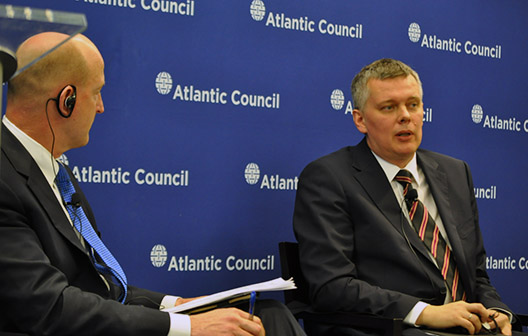 The era of peace in Europe that has lasted 25 years is drawing to an end, according to Poland’s Minister of National Defense Tomasz Siemoniak. In a public speech at the Atlantic Council, Minister Siemoniak discussed the importance of NATO’s ability to react to the ongoing crisis on its eastern flank as the threat from Russia rises and threatens to catalyze full-blown conflict.
The era of peace in Europe that has lasted 25 years is drawing to an end, according to Poland’s Minister of National Defense Tomasz Siemoniak. In a public speech at the Atlantic Council, Minister Siemoniak discussed the importance of NATO’s ability to react to the ongoing crisis on its eastern flank as the threat from Russia rises and threatens to catalyze full-blown conflict.
Against the backdrop of Russia’s illegal incursions in Ukraine, Poland is now sowing the seeds of its diligent long-term efforts to modernize its military and act as a leader in Eastern Europe for countries outside of the Euro-Atlantic framework. Minister Siemoniak illustrated his country’s emphasis on missile defense, air defense, and military modernization. Polish defense spending has increased 25% in the last five years, spurring a “revolutionary” change in Poland’s military that it first initiated when it joined NATO fifteen years ago. Additionally, while Polish public approval of NATO membership had declined prior to the Ukrainian crisis, 81% of Polish citizens now support Alliance membership.
The crisis in Ukraine is an emotional one for Poland. While many fear Cold War-era confrontation, this crisis also churns up painful memories of Poland’s struggles for independence from the Soviet Union on the 25th anniversary of the Solidarity movement. Minister Siemoniak stressed his belief that, as the transatlantic community shifts its focus toward new and emerging threats, it must not neglect the traditional threats that initially forged NATO.
During a discussion with moderator Ian Brzezinski, Senior Fellow at the Council’s Brent Scowcroft Center on International Security, Minister Siemoniak elaborated on the task of modernizing the Polish military, citing involvement in both international military efforts, such as ISAF, and joint officer training programs with western militaries as major driving forces behind modernization and professionalization. On questions of energy security, Poland views diversifying its energy resources away from Russian supplies as a high priority.
In discussing the best way to end the crisis, Minister Siemoniak stressed the importance of supporting Ukraine’s new government and working with Russia to de-escalate tensions. Poland’s role as the regional leader of Central and Eastern Europe make its involvement in resolving the confrontation crucial.
Throughout the event, Minister Siemoniak highlighted the ongoing cooperation between his country and western partners. Arriving at the Council on the heels of his meeting with US Secretary of Defense, Chuck Hagel, Minister Siemoniak voiced Poland’s wishes that the United States increase its military presence in his country. This, in Poland’s view, would serve to both assure allies of the United States’ enduring commitment to Europe’s security and deter further Russian aggression.
